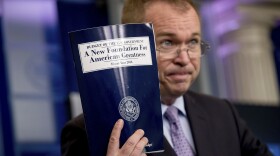
Alison Kodjak
Alison Fitzgerald Kodjak is a health policy correspondent on NPR's Science Desk.
Her work focuses on the business and politics of health care and how those forces flow through to the general public. Her stories about drug prices, limits on insurance, and changes in Medicare and Medicaid appear on NPR's shows and in the Shots blog.
She joined NPR in September 2015 after a nearly two-decade career in print journalism, where she won several awards—including three George Polk Awards—as an economics, finance, and investigative reporter.
She spent two years at the Center for Public Integrity, leading projects in financial, telecom, and political reporting. Her first project at the Center, "After the Meltdown," was honored with the 2014 Polk Award for business reporting and the Society of Professional Journalists Sigma Delta Chi award.
Her work as both reporter and editor on the foreclosure crisis in Florida, on Warren Buffet's predatory mobile home businesses, and on the telecom industry were honored by several journalism organizations. She was part of the International Consortium of Investigative Journalists team that won the 2015 Polk Award for revealing offshore banking practices.
Prior to joining the Center, Fitzgerald Kodjak spent more than a decade at Bloomberg News, where she wrote about the convergence of politics, government, and economics. She interviewed chairs of the Federal Reserve and traveled the world with two U.S. Treasury secretaries.
And as part of Bloomberg's investigative team, she wrote about the bankruptcy of General Motors Corp. and the 2010 Gulf Oil Spill. She was part of a team at Bloomberg that successfully sued the Federal Reserve to release records of the 2008 bank bailouts, an effort that was honored with the 2009 George Polk Award. Her work on the international food price crisis in 2008 won her the Overseas Press Club's Malcolm Forbes Award.
Fitzgerald Kodjak and co-author Stanley Reed are authors of In Too Deep: BP and the Drilling Race that Took It Down, published in 2011 by John Wiley & Sons.
In January 2019, Fitzgerald Kodjak began her one-year term as the President of the National Press Club in Washington, DC.
She's a graduate of Georgetown University and Northwestern University's Medill School of Journalism.
She raises children and chickens in suburban Maryland.
-
We analyze the new Republican health care bill unveiled by the Senate.
-
Senate Republicans are calling their health care bill the Better Care Reconciliation Act. It shares many provisions with the House's American Health Care Act, but goes further in cutting Medicaid.
-
The legislation Senate Republicans are releasing is expected to track the House version that was passed last month. Negotiations have been going on in secret.
-
Health insurers have to let the government know Wednesday if they'll be selling policies on the federal exchange next year. But Congress has yet to tell them what those policies will cover.
-
Job-coaching and other support services that enable many adults to live in the community instead of institutions will likely be curtailed if the GOP plan to shrink Medicaid becomes law.
-
The Nevada legislature has passed a bill that would allow anyone without health insurance in the state to buy into the Medicaid program, regardless of income. It's awaiting the governor's signature.
-
While Medicaid is best known as a health care program for poor people, more than 80 percent of its budget goes to care for elderly people, disabled people and children.
-
The vaccine against Zika vaccine was developed by the Army, with the government paying for clinical trials, too. Health officials want to be sure drugmaker Sanofi Pasteur doesn't make it unaffordable.
-
The latest analysis by the Congressional Budget Office says the bill would lead to 23 million fewer people having insurance coverage and would cut the federal deficit by $119 billion over 10 years.
-
The administration's proposed budget would cut billions out of health programs at the NIH, CDC and FDA, as well as Medicaid services for children, the elderly and disabled.








